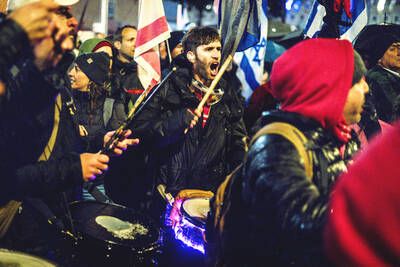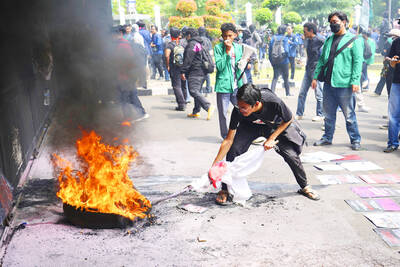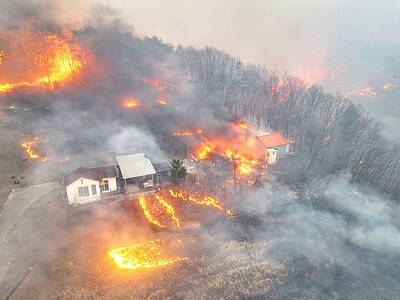The rebel victory appears to have been as unexpected as it was complete -- a battlefield win that has exposed the military weakness of Nepal's army and the political vulnerability of King Gyanendra's royal dictatorship.
Details of the assault are scant, but this much is known: the insurgents overran about 200 troops camped on a remote mountainside. At least 40 of the soldiers may have been executed. Dozens appear to have fled.
Days after Sunday's attack, the rebels' first major victory in months, the army has retaken the area around Tilli, about 550km northwest of Kathmandu, and rescued some of the troops who fled. But the rebels say they are holding 50 soldiers prisoner, and even Nepalis who support the king say the attack is alarming.
"The king was the last hope for most of us, but if attacks like this continue there will be no future for Nepal," said Sharad Thapa, a government worker in the capital. "This is just terrible."
King Gyanendra seized power Feb. 1, saying that dismissing the democratically elected government and taking the reins himself was the only way to quash the insurgency. Nearly 12,000 people have been killed since the start of the rebellion in 1996.
The coup was condemned internationally, and major allies Britain, India and the US suspended military aid.
At home, Nepalis were split -- there were few ardent supporters of the stumbling politicians who King Gyanendra had usurped, but many people also distrusted the king.
Militarily, it has produced mixed results. Attacks have dropped in larger towns, but little has changed in the countryside, where the rebels remain in control of large swaths of territory.
The attack, analysts and opposition leaders say, could seriously weaken the king.
Inderjit Rai, a political analyst in Kathmandu called it "a major blow to the government."
"It proves that security situation is still vulnerable in much of the country," he said. "If the government fails to take control of the security situation then they lose support from all the people."
"The attack has proved the king's claim of improved security to be nothing but hollow," said Ram Sharan Mahat of the Nepali Congress, Nepal's largest party.
The rebel leader who claims to have led the attack, a man known only as Prabhakar, said on the insurgent's Web site that the victory had "shaken the enemy," and proved that the guerillas could defeat the government on any battlefield. He said 26 rebel fighters were killed in the fighting.
The rebels have a strong presence across much of rural Nepal, particularly in areas where there are few military outposts, and they control much of the isolated region in the Himalayan nation's northwest and midwest.
While they are believed to have about 20,000 fighters, few observers believe they could defeat the king and take control of the nation.
So far, the king's main political opposition comes from political parties pressing to get back into power -- and not a popular movement like the one that forced the previous king, in 1990, to establish a democracy.
Some observers warn, however, that the incessant fighting between the palace and the political parties gives strength to the rebels.
The US Ambassador to Nepal, James Moriarty, said on Tuesday that "the continuing divisions between the palace and the political parties aid only the Maoists and their plans to turn Nepal into a brutal and anachronistic state."
"The people want reconciliation. They want peace. The way to achieve peace is with a democratic government united against the Maoist assault on Nepal," he said.

DEATH CONSTANTLY LOOMING: Decades of detention took a major toll on Iwao Hakamada’s mental health, his lawyers describing him as ‘living in a world of fantasy’ A Japanese man wrongly convicted of murder who was the world’s longest-serving death row inmate has been awarded US$1.44 million in compensation, an official said yesterday. The payout represents ¥12,500 (US$83) for each day of the more than four decades that Iwao Hakamada spent in detention, most of it on death row when each day could have been his last. It is a record for compensation of this kind, Japanese media said. The former boxer, now 89, was exonerated last year of a 1966 quadruple murder after a tireless campaign by his sister and others. The case sparked scrutiny of the justice system in

The head of Shin Bet, Israel’s domestic intelligence agency, was sacked yesterday, days after Israeli Prime Minister Benjamin Netanyahu said he no longer trusts him, and fallout from a report on the Oct. 7, 2023, Hamas attack. “The Government unanimously approved Prime Minister Benjamin Netanyahu’s proposal to end ISA Director Ronen Bar’s term of office,” a statement said. He is to leave his post when his successor is appointed by April 10 at the latest, the statement said. Netanyahu on Sunday cited an “ongoing lack of trust” as the reason for moving to dismiss Bar, who joined the agency in 1993. Bar, meant to

Indonesia’s parliament yesterday amended a law to allow members of the military to hold more government roles, despite criticisms that it would expand the armed forces’ role in civilian affairs. The revision to the armed forces law, pushed mainly by Indonesian President Prabowo Subianto’s coalition, was aimed at expanding the military’s role beyond defense in a country long influenced by its armed forces. The amendment has sparked fears of a return to the era of former Indonesian president Suharto, who ex-general Prabowo once served and who used military figures to crack down on dissent. “Now it’s the time for us to ask the

‘HUMAN NEGLIGENCE’: The fire is believed to have been caused by someone who was visiting an ancestral grave and accidentally started the blaze, the acting president said Deadly wildfires in South Korea worsened overnight, officials said yesterday, as dry, windy weather hampered efforts to contain one of the nation’s worst-ever fire outbreaks. More than a dozen different blazes broke out over the weekend, with Acting South Korean Interior and Safety Minister Ko Ki-dong reporting thousands of hectares burned and four people killed. “The wildfires have so far affected about 14,694 hectares, with damage continuing to grow,” Ko said. The extent of damage would make the fires collectively the third-largest in South Korea’s history. The largest was an April 2000 blaze that scorched 23,913 hectares across the east coast. More than 3,000